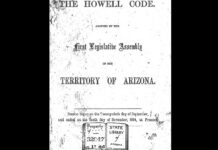
Detectives from Partners Against Narcotics Trafficking, a multi-agency task force, arrested Adam Dearmon, 49, of Camp Verde with multiple drug offenses after $30,000 worth of mescaline, a psychedelic drug found in peyote, was discovered inside his home on Tuesday, Feb. 2, 2021.
This arrest comes after an intensive investigation conducted in partnership with PANT, YCSO and the Camp Verde Marshal’s Office.
The investigation revealed Dearmon was allegedly running a large-scale illegal drug business out of his home located in the 400 block of West Angus Drive in Camp Verde.
During the search of the residence on Feb. 2, investigators found 8.9 Pounds of mescaline, 427 live peyote cacti, 83 marijuana plants, 29 pounds of dry peyote, 59 pounds of processed marijuana, 5 pounds of psilocybin mushrooms, and 7 LSD tabs. There were many other substances found inside the residence and detectives are working on identifying those substances.

Under Arizona’s new Proposition 207, people can possess up to one ounce of marijuana and cultivate up to six plants. Lysergic acid diethylamide aka LSD, peyote, mescaline and psilocybin mushrooms are all Schedule 1 illegal drugs under federal law.
Dearmon’s operation included having packages of Mescaline shipped from Peru to his home.
Investigators learned the suspect may have started a Native American church to justify selling psychedelic drugs.
“Individuals exploiting sacred Native American rituals to illegally sell massive amounts of psychedelics and other drugs in our community will be held accountable,” Sheriff David Rhodes said. “I’m proud that we could partner with multiple agencies to help arrest Dearmon and keep our community safe.”
“I would like to personally commend the incredible investigative work conducted by PANT and the other participating agencies. The successful outcome of these cases has a huge impact on the safety of our community,” Camp Verde Marshal Corey Rowley said. “The positive teamwork and relationship we have with the Yavapai County Sheriff’s Office shows in these types of cases. Our officers and support staff who participated in this search warrant can be proud of the success in making Camp Verde a safer place.”

Dearmon was booked into the Yavapai County Detention Center in Camp Verde on charges of possession of dangerous drugs for sale (mescaline and mushrooms), possession of dangerous drugs (LSD), cultivating marijuana, possession of peyote for sale, and possession of drug paraphernalia.

In addition, 48-year-old Tiffany Michelle Smith, who lives with Dearmon, faces similar charges for being involved in the operation.
Dearmon and Smith were released Feb. 3 on a $10,000 bond each.
On his Facebook page on Feb 10, Dearmon posted a link to the story from YCSO and the statement “I love Each Of You so much. ![]() I could Use your Support. This is not True!!!!”
I could Use your Support. This is not True!!!!”
Dearmon also uses the names “Adam Yellowbird,” “Adam DeArmon” and “Yellowbird DeArmon” and lists himself as the “executive producer/founder of International Center of Spiritual and Ancestral Wisdom” with a mailing address in Cornville.
According to the ICSAW website, he founded the “Institute of Cultural Awareness” in 2009, is “ambassador for International Center for Cultural Studies,” “foreign ambassador and minister for All Nations Native American Church” and founded the “Earth Dance8 International Multicultural Gathering” which has held events on U.S. Forest Service land and private land in the Verde Valley.

After the deaths of three participants of a sweat lodge event held by New Age speaker James Arthur Ray in 2009, for which Ray was later convicted and sentenced to three years prison, the Black Hills Sioux Nation Treaty Council and other numerous American Indian groups representing Sioux and Lakota interests filed lawsuits and complaints against non-Native individuals conducting such ceremonies.
Floyd Hand Jr., an Oglala delegate on the treaty council, and Ivan H. Lewis, a member of the Pima, Maricopa and Yavapai tribes, filed suit in November 2009 against the federal government, the state of Arizona then-U.S. Attorney General Eric Holder, then-Arizona Gov. Jan Brewer and then-Arizona Attorney General Terry Goddard for failure to uphold the “bad men” clause of the Fort Laramie Treaty of 1868.
The lawsuit was ultimately dismissed, but state authorities have been more active in protecting the rights of Sioux and Lakota from non-Natives using sweat lodge or “inikaga” rituals without permission from American Indian tribal representatives.
In September 2012, the Yavapai County Development Services Department ordered members of the All Nations Native American Church to cease holding “religious” sweat lodge ceremonies and to disassemble sweat lodge structures on the Cornville parcel Dearmon rented at the time.
Dearmon were both notified in writing by the Hopi Tribe 2009 to cease and desist advertising “Return of the Ancestors” Gathering at Hopi sacred sites, as was Dearmon’s associate, Ruben Saufkie Sr., a member of the Hopi Tribe.
Around the same time, Northern Arizona University formally notified Dearmon in writing that NAU would not allow his “Return of the Ancestors” Gathering on university property for which Dearmon had not asked permission.
UPDATE:
On May 2, 2022, Dearmon pleaded guilty to a Class 6 felony.

Dearmon was sentenced by to Yavapai Superior Court Judge Michael R. Bluff to
- 120 days in jail of a sentence, suspended, pursuant to standard supervised probation for three years which begins June 1, 2022.
- a $750 fine with a 78% surcharge
- and a $300 interstate compact fee because Dearmon left Arizona and reportedly has a been living in Willits, Mendocino County, Calif., according to the Yavapai Superior Court, after living in Nevada City, Calif, following release after his arrest.
- numerous other fines and surcharges
In the March 28, 2022, plea agreement, Dearmon acknowledged he was pleading guilty and that, if he violates his three-year supervised probation, he faces 120 days in jail:

On May 12, 10 days after Dearmon was sentenced pursuant to his plea agreement, through an intermediately, Abby Kojola, Dearmon posted an update on his online fundraising platform falsely claiming, “An update from Adam. His case has been dismissed and he is free”:

Dearmon’s was not dismissed. He was convicted and sentenced.
Dearmon later contacted Larson Newspapers via Facebook falsely alleging he had been exonerated and the case was concluded. However, this was false, and Dearmon admitted guilt in a plea agreement and was sentenced. When this material was posted to the same Facebook story, Dearmon removed his misleading comments later in the day.
V1300CR202180074-4-7-2022-PLEA-AGREEMENT-PLEA-AGREEMENT-D-1 V1300CR202180074-5-2-2022-MINUTE-ENTRY-SENTENCING-D-1On June 7, the representative of a consulting firm who claimed to be working on Dearmon’s behalf contacted Larson Newspapers with a statement from Dearmon. In the statement, Dearmon claimed he is “is a tribal member of Choctaw Muskogee Yamassee Nation”; that law enforcement conducted a raid “during a ceremony last February 2nd, 2021, at his federally recognized church and home located in Arizona”; and that Dearmon “is the designated spiritual custodian of the Oklevueha Native American Church for Native American tradition.”
Dearmon’s Camp Verde home was not a “federally recognized church.” He provided no evidence to the contrary.
“Choctaw Muskogee Yamassee Nation” not a recognized American Indian Tribe
The Choctaw Muskogee Yamassee Nation is not an Indian tribe recognized by the United States Bureau of Indian Affairs nor is the Yamassee tribe a federally recognized Native American tribe recognized by the U.S. Department of State.
The Yamassee were a tribe in northern coastal Georgia near the Savannah River and northeastern Florida, but after the Yamassee War of 1715-1717, the Yamassee were ravaged by a smallpox epidemic in 1727 and dispersed, with survivors joining the nearby Seminole or Creek tribes. The Yamassee ceased to exist by 1730.
According the National Indian Law Library, the “‘Choctaw Muskogee Yamassee Nation’ is not an Indian tribe recognized by the United States Bureau of Indian Affairs,” according to a ruling by U.S. District Judge J.P. Stadtmueller of the U.S. District Court for the Eastern District of Wisconsin in the federal case of BOON-BEY v. SKWIERAWSKI [Case No. 19-CV-985-JPS] on Oct. 30, 2019.
In that case, Kevin Michael Boon-Bey alleged he was, like Dearmon, a tribal member of the “Choctaw Musgokee Yamassee Nation,” and his children are tentative members, meaning that his custody case had to be transferred to a tribal court under the Indian Child Welfare Act. The court determined that the “tribe” was not legitimate; was not recognized by any federal agency; there was no Choctaw Musgokee Yamassee Nation Tribal Court located in Lancaster, Calif.; that “Principal Chief of the West Coast Choctaw Musgokee Yamassee Nation Rawsheed Stone Coyote Patton” represented no tribal nation and that Boon-Bay’s claim of the tribe’s legitimacy was “a laundry-list citation to (irrelevant) treaties and statutes purporting to establish the existence of the Choctaw Musgokee Yamassee Nation. The Plaintiffs have not established their membership in a recognized Indian tribe, and even if they had, they do not tie that fact to any cognizable claim.”
“Membership” in the Choctaw Muskogee Yamassee Nation is open to anyone who fills out a registration form on its website, unlike legitimate American Indian tribes that require an official Bureau of Indian Affairs-issued Certificate Degree of Indian Blood and an extensive application process between individuals, official tribes and the BIA.
In 2016, Humberto Reveles, man who claimed to be a “Yamassee chief,” was sentenced to nearly 3 years in federal prison for selling membership to the “Yamassee tribe,” which courts determined was a non-recognized American Indian tribe. Reveles’ sentence was announced by U.S. Attorney Kenneth Magidson, Southern District of Texas after an investigation was conducted by U.S. Immigration and Customs Enforcement’s Homeland Security Investigations and the U.S. Department of State Diplomatic Security Service with assistance from U.S. Customs and Border Protection’s Border Patrol, FBI and Brownsville Police Department.
According to court documents, Reveles admitted to selling membership in the Yamassee tribe as part of a scheme to defraud his customers. Reveles was the chief and later grand chief of the tribe. He claimed the tribal identification documents that he sold with tribe membership would allow tribe members to remain in the United States, prevent them from being deported, allow them to travel within and work in the country, despite not having a lawful immigration status.
Reveles opened an office where he met with prospective tribe members in addition to holding informational meetings. Prospective tribe members paid Reveles or his employees and were to receive tribal naturalization certificates, tribal identification cards and tribal drivers’ licenses. The documents were to be presented in support of the false immigration claims underlying the scheme.
According to federal authorities, the Yamassee tribe is not a federally recognized Native American tribe, and is not recognized by the U.S. Department of State.
‘Oklevueha Native American Church’
The Oklevueha Native American Church claims to “welcome[] people of all races, nationalities, religions, and lifestyles without prejudice.” According to Courthouse News Service, “Anyone can join James Mooney’s Oklevueha Native American Church online by paying $200 and filling out a form, regardless of their membership status with a native tribe.”
ONAC filed suit in 2016 claiming that prosecution of one of their member’s use of marijuana violated First Amendment religious protections, but U.S. District Judge Susan Oki Mollway of the District of Hawaii dismissed the lawsuit, writing that Mooney had nothing but “a strongly held belief in the importance or benefits of marijuana” and that prohibiting marijuana use would not create a “substantial burden” on his religion. The 9th Circuit U.S. Court of Appeals later affirmed Mollway’s ruling:
Oklevueha-Native-American-Church-14-15143According to various articles in Indian Country Today, the Oklevueha Native American Church is not a legitimate American Indian religious organization but rather one for “non-Native ‘Pretendians'” to misuse First Amendment protections for American Indian religious beliefs as a screen to permit drug use of otherwise illegal drugs.
National Council of Native American Churches speak out against organizations like Oklevueha
“On Friday, Feb. 12, 2016, official representatives of the National Council of Native American Churches met in Laredo, Texas, to discuss among other business matters the proliferation of organizations appropriating the ‘Native American Church’ name, despite the fact that these appropriators have absolutely no ties to the indigenous worship of the holy sacrament Peyote.”
“The National Council consists of legitimate, indigenous member organizations that include the Native American Church of North America, the Azzee’ Bee Nahaga of Dine’ Nation, the Native American Church of the State of Oklahoma, the Native American Church of the State of South Dakota, and invited leaders of the Consejo Regional Wixarika of Mexico.”
“On Feb. 13 2016, the member organizations of the National Council signed a statement to make it publicly known that they do not condone the activities of these illegitimate organizations. Some of these organizations, comprised of non-Native people, are now claiming that marijuana, ayahuasca, and other substances are part of Native American Church theology and practice. Nothing could be further from the truth. The only plant that serves as a sacrament is Peyote, and without Peyote, indigenous Native American Church ceremonies cannot take place. We reject and condemn any claim by these illegitimate organizations that marijuana or any other plant serves or has ever served as a sacrament in indigenous Native American Church ceremonies.”
“For over 30 years, the Native American Rights Fund has represented the Native American Church of North America and in that capacity has worked with the other member organizations of the National Council.”



















